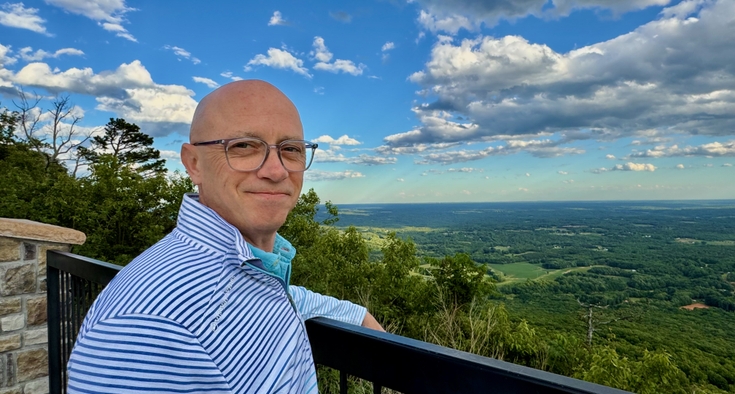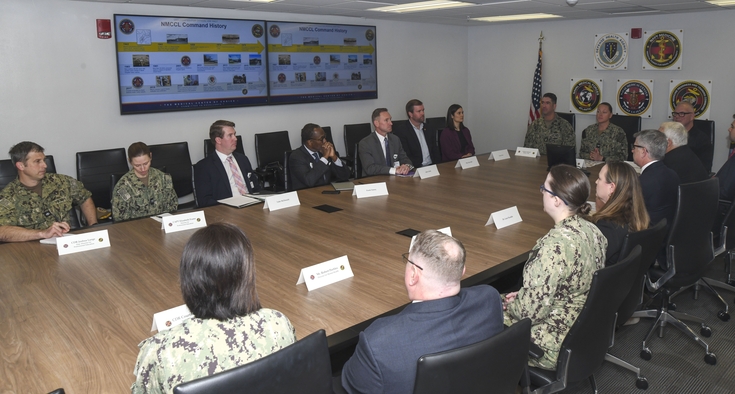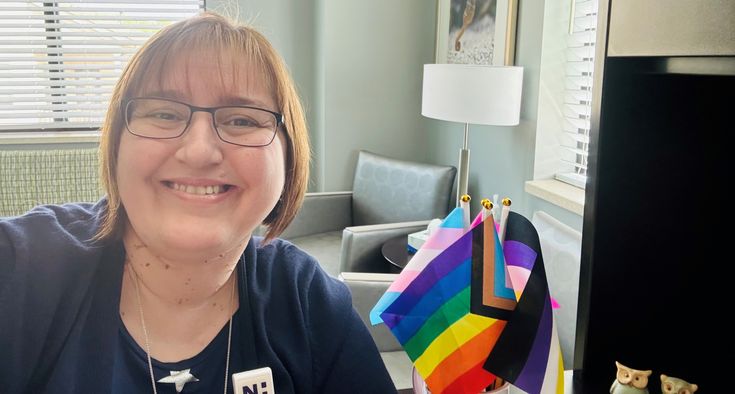Working to recover from substance use disorder (formerly known as addiction), Tommy Carpenter never could have imagined that his journey would lead to Novant Health, helping others shed the shackles of drugs and alcohol.
Carpenter is a peer support specialist who works with medical teams to help provide an extra layer of support. The major qualification for the job? He’s walked a mile in his patients’ shoes.
I can look them in the eye not as a doctor or nurse but as someone who knows what it’s like to be in that position, to show them they are not alone,” Carpenter said.
Peer support specialists (PSS) are people living in recovery from mental illness and/or substance use disorder who support others who can benefit from their experiences. Certification is required to be a PSS. Certification means the peer has met the requirements to support individuals with mental health or substance use disorder.
“You’ve had to have lived the trouble,” said Jason Barnett, supervisor for behavioral health clinical services/tele-therapy. “That’s what peer support specialists are offering. This really is Tommy’s calling.”
Get quick access to a licensed therapist for mental health help.
‘You can do it differently’
The peer support program reflects Novant Health’s understanding that a mental health issue can lurk below the surface of a patient’s physical concern. In 2024, peer support specialists had 39,515 encounters with patients (some patients have more than encounter).
Here’s how it works:
Each specialist must have dealt with (and overcome) a mental health or substance abuse issue or had a family member do so. Each also must have completed training and been certified for the job.
With the help of medical staff, they connect with emergency room patients who exhibit or share some level of depression, anxiety, suicidal thoughts, panic attacks or other issues that need addressing.
In the case of substance use disorders, the peer support specialist can help get a patient into a detox program. Peer support specialists also serve “partial hospitalization” patients who typically receive care in an outpatient setting.
Barnett said peer support specialists deepen their understanding of patients’ issues by talking with their physician and loved ones. They contribute insights that help medical teams, including psychiatrists, assess how best to treat the patient.
A peer support specialist is embedded in the emergency department at five of Novant Health’s 16 North Carolina hospitals. Carpenter serves the emergency departments at the remaining 11 community hospitals.
Carpenter, 47, lives in Mount Airy, the small town where he was raised, north of Winston-Salem. He works from home via video conferencing, his patients referred to him from the emergency rooms. In a typical week, if there is such a thing, he’ll conduct 20 to 30 video calls. Beyond sharing resources, he reminds them they are not alone.
Carpenter’s supervisor, Barnett, said his positive spirit comes through every call. His smile, too.
Every conversation, Carpenter said, hits home, including one that mirrored his experience. Carpenter and the client were about the same age. Each dealt with a divorce and issues in court. Like Carpenter, the client didn’t know where to turn so he turned to alcohol. Having been down that road, Carpenter pointed him to Alcoholics Anonymous, and shared his best advice:
“You don’t have to (live) like this. You can do it differently.”
Carpenter ought to know.
‘I want to be a helper to others’
Alcohol – specifically beer – had long wreaked havoc on Carpenter. “If I had it,” he said, “I drank it.” He tried his hand at college but said (joking but not really) his blood alcohol level was higher than his GPA. After suffering a broken back and other injuries in a 2014 wreck – he had been drinking and smoking marijuana – he was prescribed an opioid, oxycodone, for the pain.
“I loved them,” he said.
That’s the problem. The Centers for Disease Control and Prevention reported 54,743 overdose deaths involving opioids in 2024. That includes fentanyl. While the number of opioid-related deaths is declining, health care and law enforcement experts agree that it remains a national crisis. Dr. Grant Baldwin of the Centers for Disease Control and Prevention calls it an “everyone, everywhere problem.”
The opioids brought him even lower. That’s when Carpenter found himself at Charlotte Rescue Mission, the Christ-centered residential drug and alcohol recovery program near center city. He graduated from the 90-day program in 2015 then stayed on as a staff member for two years. Part of his job included giving drug and breathalyzer tests to residents. The best part of his job was showing the other guys that if he could do this, they could.
“I want to be a helper to others,” he said.
He worked for five years at Genesis Project in Charlotte, which helps those struggling with addiction, abuse and other issues. After earning his peer support certification in 2018, he joined Novant Health.
He loves his work. His relationship with his three children is improving. He regularly attends AA meetings. His deep faith leads him to Central Church of God in Charlotte.
Carpenter has been clean and sober since March 17, 2015. His drink of choice now is water.
Finding the answers
Who can say what underlying challenges lead a person to a hospital emergency room? Novant Health is counting on peer support specialists to help find answers that open a door to healing, said Paula Bird, vice president of behavioral services.
As she puts it, “You can’t have any health without mental health.”











